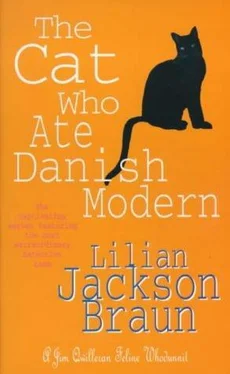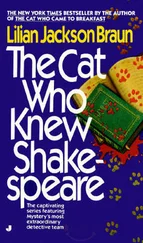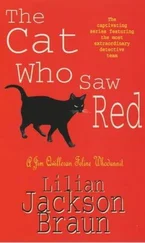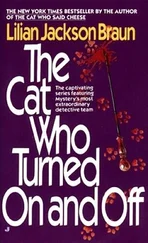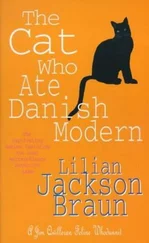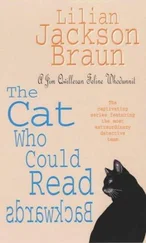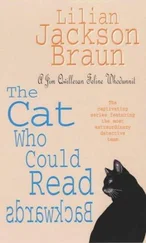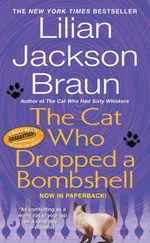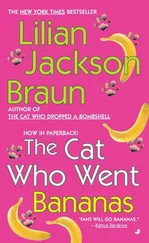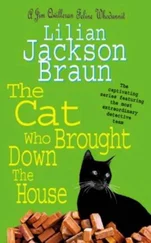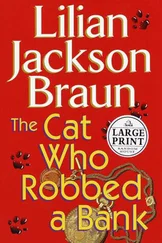Lillian Braun - The Cat Who Ate Danish Modern
Здесь есть возможность читать онлайн «Lillian Braun - The Cat Who Ate Danish Modern» весь текст электронной книги совершенно бесплатно (целиком полную версию без сокращений). В некоторых случаях можно слушать аудио, скачать через торрент в формате fb2 и присутствует краткое содержание. Жанр: Классический детектив, на английском языке. Описание произведения, (предисловие) а так же отзывы посетителей доступны на портале библиотеки ЛибКат.
- Название:The Cat Who Ate Danish Modern
- Автор:
- Жанр:
- Год:неизвестен
- ISBN:нет данных
- Рейтинг книги:5 / 5. Голосов: 1
-
Избранное:Добавить в избранное
- Отзывы:
-
Ваша оценка:
- 100
- 1
- 2
- 3
- 4
- 5
The Cat Who Ate Danish Modern: краткое содержание, описание и аннотация
Предлагаем к чтению аннотацию, описание, краткое содержание или предисловие (зависит от того, что написал сам автор книги «The Cat Who Ate Danish Modern»). Если вы не нашли необходимую информацию о книге — напишите в комментариях, мы постараемся отыскать её.
The Cat Who Ate Danish Modern — читать онлайн бесплатно полную книгу (весь текст) целиком
Ниже представлен текст книги, разбитый по страницам. Система сохранения места последней прочитанной страницы, позволяет с удобством читать онлайн бесплатно книгу «The Cat Who Ate Danish Modern», без необходимости каждый раз заново искать на чём Вы остановились. Поставьте закладку, и сможете в любой момент перейти на страницу, на которой закончили чтение.
Интервал:
Закладка:
He found the firm of Lyke and Starkweather in an exclusive shopping area, surrounded by specialty shops, art galleries, and tearooms. The entrance was impressive. Huge double doors of exotically grained wood had silver door handles as big as baseball bats.
The interior displayed furniture in room settings, and Qwilleran was pleased to find one room wallpapered in a red plaid that matched his tie. Moose antlers were mounted above a fireplace made of wormeaten driftwood, and there was a sofa covered in distressed pigskin, like the hides of retired footballs. A slender young man approached him, and the newsman asked to see Mr. Lyke or Mr. Starkweather. After a delay that seemed inauspicious, a gray-haired man appeared from behind an Oriental screen at the rear of the shop. He had a bland appearance and a bland manner.
"Mr. Lyke is the one you should talk to, if it's about publicity," he told Qwilleran, "but he's busy with a client. Why don't you just look around while you're waiting?" "Are you Mr. Starkweather?" Qwilleran asked.
"Yes, but I think you should talk to Mr. Lyke. He's the one…." "I'd appreciate it if you'd tell me about these displays while I'm waiting." Qwilleran motioned toward the moose antlers.
"There isn't much to tell," said Starkweather with a helpless gesture.
"What's selling these days?" "Just about everything." "Is there any particular color that's popular?" "No. They're all good." "I see you have some modern stuff over there." "We have a little of everything." Qwilleran's interviewing technique was not working. "What do you call that thing?" he asked, pointing to a tall secretary-desk with a bulbous base and an inlaid design of exotic birds and flowers.
"It's a desk," said Starkweather. Then his expressionless face brightened a fraction of a degree. "Here comes Mr.
Lyke." From behind the Oriental screen came a good-looking man in his early thirties. He had his arm around an elaborately hatted middle-aged woman who was smiling and blushing with pleasure.
Lyke was saying in a deep, chesty voice: "You go home, dear, and tell the Old Man you've got to have that twelve- foot sofa. It won't cost him a cent more than the last car he bought. And remember, dear, I want you to invite me to dinner the next time you're having that superb chocolate cake. Don't let your cook bake it. I want you to bake it yourself-for David." While he talked, David Lyke was walking the woman rapidly toward the front door, where he stopped and kissed her temple. Then he said a beautifully timed goodbye, meaningful but not lingering.
When he turned toward Qwilleran, he recomposed his face abruptly from an expression of rapture to one of businesslike aplomb, but he could not change his eyes. He had brooding eyes with heavy lids and long lashes. Even more striking was his hair-snow white and somewhat sensational with his young suntanned face.
"I'm David Lyke," he growled pleasantly, extending a cordial hand. His eyes flickered downward for only a second, but Qwilleran felt they had appraised his plaid tie and the width of his lapel. "Come into my office, and we'll talk." The newsman followed him into a room that had deep-gray walls. A leopard rug sprawled on the polished ebony floor. Lounge chairs, square and bulky and masculine, were covered in fabric with the texture of popcorn. On the back wall was a painting of a nude figure, her skin tones a luminous blue-gray, like steel.
Qwilleran found himself nodding in approval.
"Nice office." "Glad you like it," the decorator said. "Don't you think gray is terribly civilized? I call this shade Poppy Seed. The chairs are sort of Dried Fig. I'm sick to death of Pablum Beige and Mother's Milk White." He reached for a decanter. "How about a splash of cognac?" Qwilleran declined. He said he would rather smoke his pipe. Then he stated his mission, and Lyke said in his rumbling voice: "I wish you hadn't called your magazine Gracious Abodes. It gives me visions of lavender gloves and p?che Melba." "What kind of decorating do you do?" the newsman asked.
"All kinds. If people want to live like conquistadors or English barons or little French kings, we don't fight it." "If you can find an important house for us to photograph, we'll put it on the cover of our first issue." "We'd like the publicity," said the decorator, "but I don't know how our clients will react. You know how it is; whenever the boys in Washington find out a taxpayer has wall-to-wall carpet in his bathroom, they audit his tax returns for the last three years." He was flipping through a card index. "I have a magnificent Georgian Colonial job, done in Champagne and Cranberry, but the lamps haven't arrived…. And here's an Edwardian town house in Benedictine and Plum, but there's been a delay on the draperies; the fabric manufacturer discontinued the pattern." "Could the photographer shoot from an angle that would avoid the missing drapes?" Lyke looked startled, but he recovered quickly and shook his head. "No, you'd have to include the windows." He browsed through the file and suddenly seized an index card. "Here's a house I'd like to see you publish! Do you know G.
Verning Tait? I did his house in French Empire with built-in vitrines for his jade collection." "Who is this Tait?" Qwilleran asked. "I'm new in this city." "You don't know the Taits? They're one of the old families living in pseudocastles down in Muggy Swamp. You know Muggy Swamp, of course — very exclusive." The decorator made a rueful face. "Unfortunately, the clients with the longest pedigrees are the slowest to pay their bills." "Are the Taits very social?" "They used to be, but they live quietly now. Mrs. Tait is unwell, as they say in Muggy Swamp." "Do you think they'd let us photograph?" "People with Old Money always avoid publicity on their real estate," Lyke said, "but in this case I might be able to use a little persuasion." Other possibilities were discussed, but both the decorator and newsman agreed the Tait house would be perfect: important name, spectacular decor, brilliant color, and a jade collection to add interest.
"Besides that," said Lyke with a smug smile, "it's the only job I've succeeded in getting away from the Sorbonne Studio. It would give me a lot of satisfaction to see the Tait house on the cover of Gracious Abodes." "If you succeed in lining it up, call me immediately," Qwilleran said. "We're working against time on the first issue. I'll give you my home phone." He wrote his number on a Daily Fluxion card and stood up to leave.
David Lyke gave him a parting handshake that was hearty and sincere. "Good luck with your magazine. And may I give you some fatherly advice?" Qwilleran eyed the younger man anxiously.
"Never," said Lyke with an engaging smile, "never call draperies drapes." Qwilleran returned to his office, pondering the complexities of his new beat and thinking fondly of lunch in the familiar drabness of the Press Club, where the wall color was Sirloin, Medium Rare.
On his desk there was a message to call Fran Unger. He dialed her number reluctantly.
"I've been working on our project," said the women's editor, "and I have some leads for you.
Have you got a pencil ready?… First, there's a Greek Revival farmhouse converted into a Japanese teahouse.
And then there's a penthouse apartment with carpet on the walls and ceiling, and an aquarium under the glass floor. And I know where there's an exciting master bedroom done entirely in three shades of black, except for the bed, which is brass.
… That should be enough to fill the first issue!" Qwilleran felt his moustache bristling. "Well, thanks, but I've got all the material I need for the first book," he said, aware that it was a rash lie.
"Really? For a beginner you're a fast worker. What have you lined up?" "It's a long, involved story," Qwilleran said vaguely.
"I'd love to hear it. Are you going to the Press Club for lunch?" "No," he said with hesitation. "As a matter of fact, I'm having lunch… with a decorator… at a private club." Fran Unger was a good newspaperwoman, and not easy to put down. "In that case, why don't we meet for drinks at the Press Club at five thirty?" "I'm sorry," Qwilleran said in his politest voice, "but I've got an early dinner date uptown." At five thirty he fled to the sanctuary of his apartment, carrying a chunk of liver sausage and two onion rolls for his dinner. He would have preferred the Press Club. He liked the dingy atmosphere of the club, and the size of the steaks, and the company of fellow newsmen, but for the last two weeks he had been driven to avoiding his favorite haunt. The trouble had started when he danced with Fran Unger at the Photographers' Ball. Apparently there was some magic in Qwilleran's vintage fox trot that gave her aspirations. She had been pursuing him ever since.
Читать дальшеИнтервал:
Закладка:
Похожие книги на «The Cat Who Ate Danish Modern»
Представляем Вашему вниманию похожие книги на «The Cat Who Ate Danish Modern» списком для выбора. Мы отобрали схожую по названию и смыслу литературу в надежде предоставить читателям больше вариантов отыскать новые, интересные, ещё непрочитанные произведения.
Обсуждение, отзывы о книге «The Cat Who Ate Danish Modern» и просто собственные мнения читателей. Оставьте ваши комментарии, напишите, что Вы думаете о произведении, его смысле или главных героях. Укажите что конкретно понравилось, а что нет, и почему Вы так считаете.
